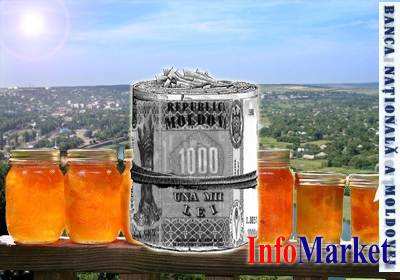
The National Bank of Moldova has kept the base rate applied to the main short-term operations of monetary policy at the same level of 2.65% per annum.
The corresponding decision was made by the NBM Executive Committee at the first meeting this year held on Friday on monetary policy. According to the National Bank, he also left unchanged interest rates on overnight loans and deposits at 5.15% and 0.15%, respectively. The norm of required reserves on attracted funds in Moldovan lei and in non-convertible currency was kept at the level of 32% of the calculation base, and the norm of required reserves at the expense of attracted funds in freely convertible currency - at 30% of the calculation base. This decision of the NBM is aimed at maintaining monetary conditions favorable to support domestic demand, the lending process and economic activity. The NBM notes that, in the context of the previously adopted monetary policy measures, for the second quarter in a row there is a recovery in lending - the volume of new loans in the national currency increased by 10.2% on an annualized basis. The National Bank emphasizes that today's decision on monetary policy was made against the backdrop of continuing disinflationary risks generated by a number of factors, including an insufficient fiscal impulse in case of restricting access to external financing. At the same time, the NBM predicts an improvement in the sentiments of consumers and economic agents, a recovery in agriculture after a dry year and a partial recovery in external demand. During the meeting, the NBM also approved the Inflation Report No. 1 for 2021, which will be published on February 5, according to the approved schedule. It should be noted that the last time the National Bank changed the base rate applied to the main short-term operations of monetary policy was on November 6, 2020, when it was reduced by 0.1 percentage points - from 2.75% to 2.65% and then reached new record low. At the same time, the National Bank also lowered by 0.1 percentage points interest rates on overnight loans and deposits: on loans - from 5.25% to 5.15%, and on deposits - from 0.25% to 0.15%. In general, the National Bank in 2020 reduced the base rate applied to the main short-term operations of monetary policy from 5.5% to 2.65% per annum. Herewith, the interest rate on overnight loans in 2020 was reduced from 8.5% to 5.15%, and on overnight deposits - from 2.5% to 0.15%. The norms of required reserves for attracted funds in Moldovan lei and foreign currency were also changed. Meanwhile, in 2020, the required reserve ratio on attracted funds in Moldovan lei and in non-convertible currency was reduced from 41% to 32% of the calculation base, and the required reserve ratio at the expense of attracted funds in freely convertible currency was increased from 20% to 30 % of the calculated base. As the NBM President Octavian Armasu noted earlier, these decisions were intended to balance the further use of this monetary policy instrument to optimize financial intermediation in the banking sector and to strengthen the transmission mechanism of monetary and foreign exchange policy. It should be noted that inflation in Moldova in 2020 amounted to 0.39% against 7.54% a year earlier. The President of the National Bank of Moldova, Octavian Armasu, noted at the end of last year that the downward trend in inflation continues in the country, which is decreasing at a higher rate than previously expected, and there are risks of reducing the annual inflation in the country to zero. The head of the National Bank stressed earlier that the disinflationary pressure in the country will continue due to the persistence of lower demand for goods and import prices, and there is a risk that inflation will continue to decline in 2021. In the context of the pandemic crisis, the national economy has been seriously affected, including, from negative evolution in the agricultural sector as well. // 29.01.2021 — InfoMarket.






